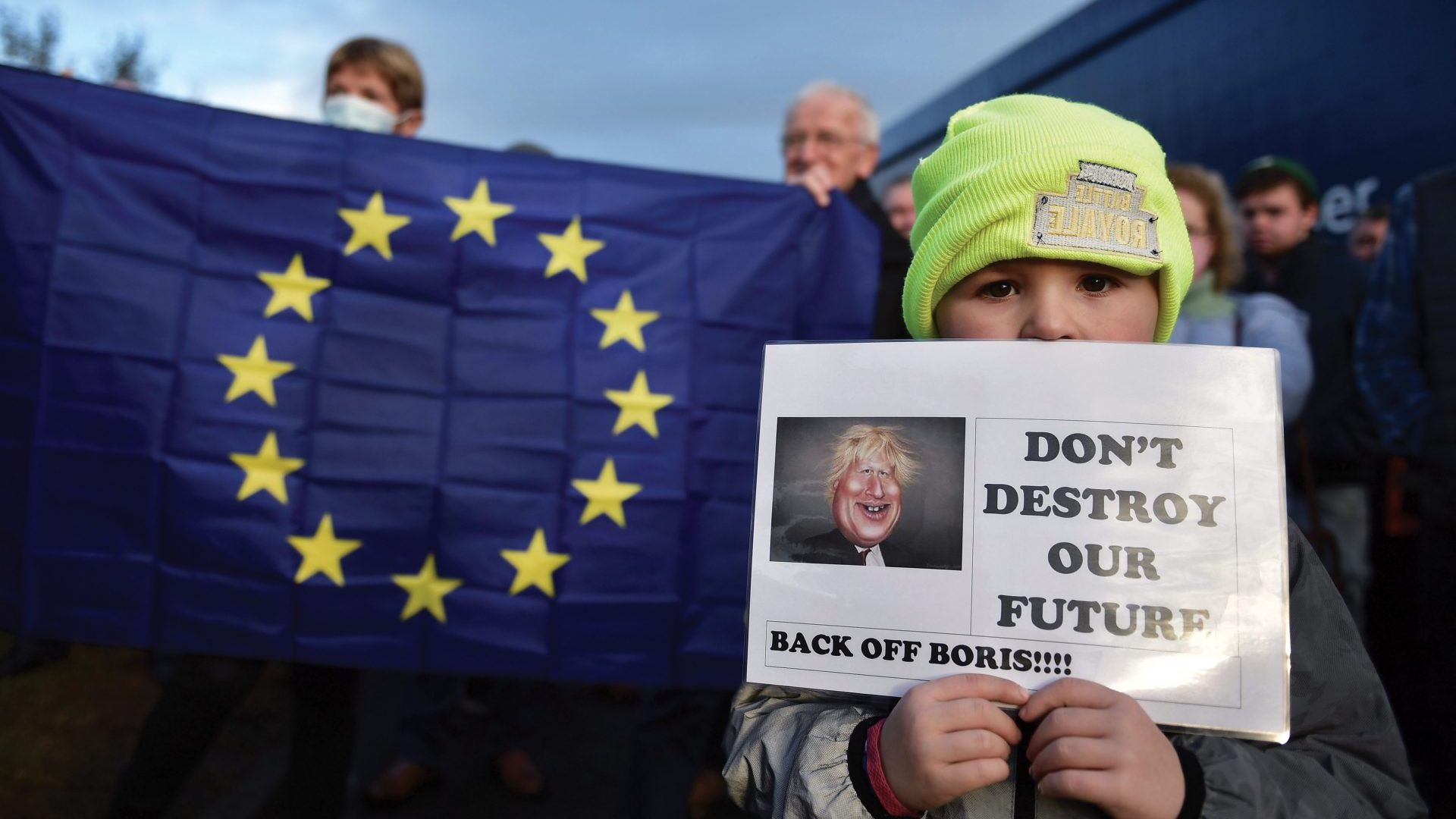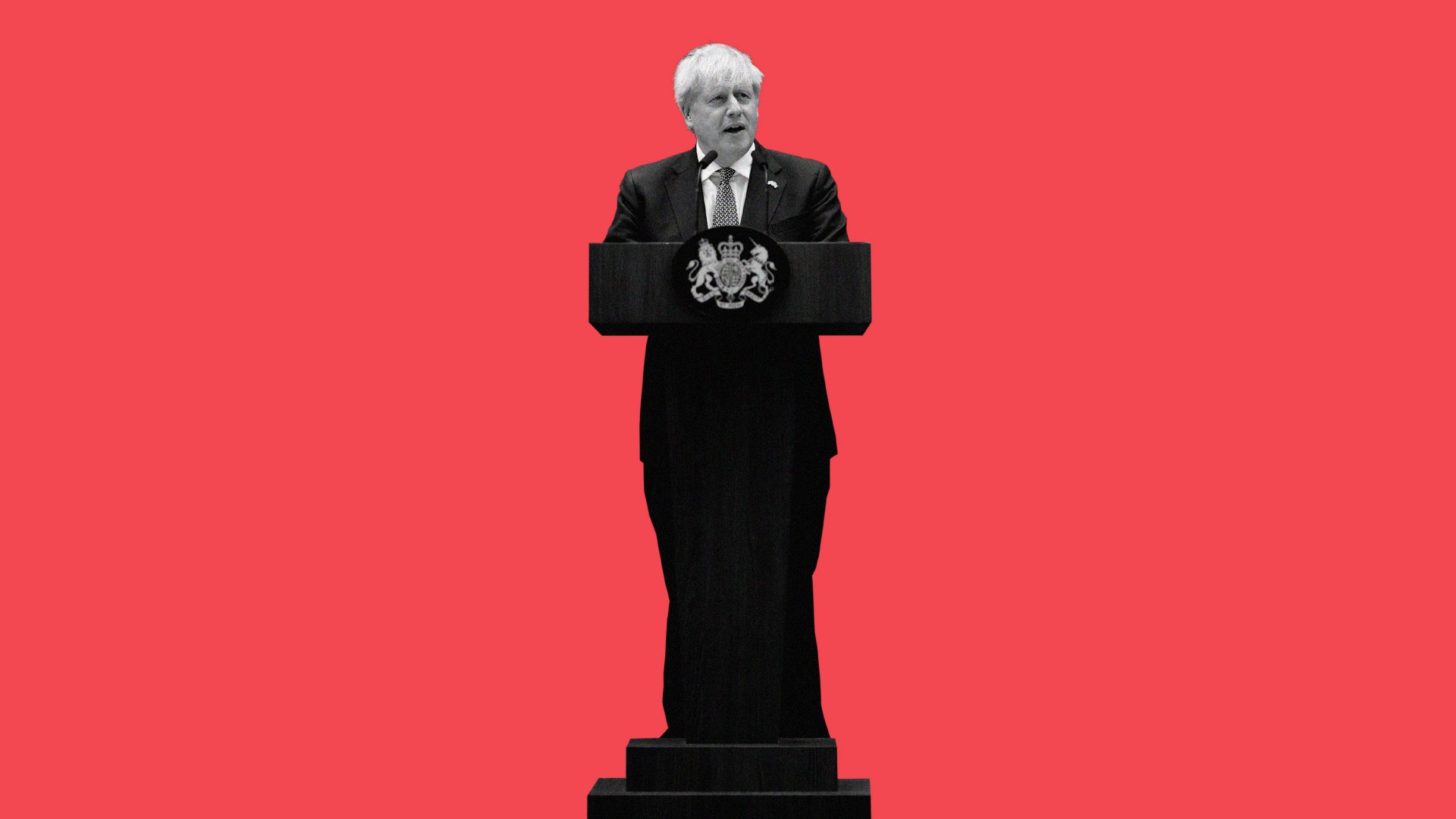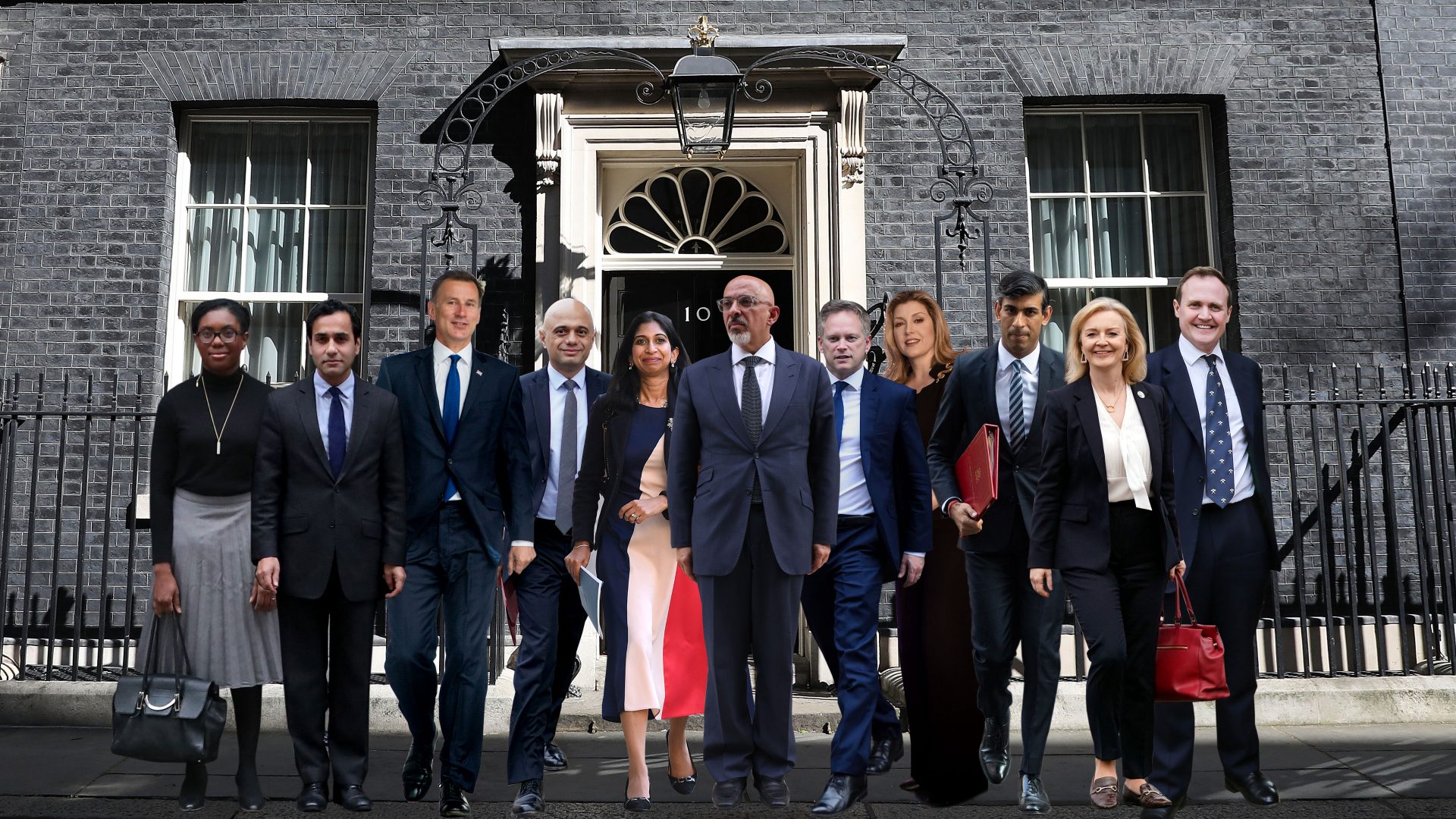First out of the blocks was Suella Braverman; just before the prime minister agreed to stand down, she was on BBC Radio 4’s Today programme, laying out her bid for the leadership. It consisted of Brexit, more Brexit, leaving the ECHR and, of course, tearing up the Northern Ireland Protocol.
Like every other candidate she will have to try to appeal to the hardline European Research Group (ERG), and then the Tory party membership. Both of which are made up of Brexit-supporting ultras who want nothing better than to discard not just the protocol but the Trade and Cooperation Agreement as well. They think that Brexit is not going well because it is not radical enough – all the evidence points to the exact opposite – but that is what they want and that is what all the candidates are going to offer them.
So, the idea that the fall of Boris Johnson will lead to a smoother, better Brexit is for the fairies. This matters because the fight this current government has picked with the EU is over Northern Ireland and nothing about the fall of the PM is going to change that. The government will go ahead, under whoever is elected leader, and try to rip up the deal it signed less than three years ago.
Why they want to do this has nothing to do with economics and very little to do with Northern Ireland politics, it is purely just another Brexit fantasy. But what are the facts?
If you wanted the best possible access to the EU and British economies, a safe and secure environment, with access to a well-educated workforce and with generous government subsidies for investment, where in the whole of Europe would you base your company?
All those who said Northern Ireland can go to the top of the class. It’s a no-brainer, it is in the UK and the EU economies.
For that serendipitous result we should give thanks to the brilliant oven-ready deal negotiated by that master diplomat Lord Frost and his Bismarckian prime minister Boris Johnson, who bestrode the world of diplomacy like a new Colossus of Rhodes.
Or as the British government now puts it, it’s a disaster and we have to break international law to bring it down, raze it to the ground and spit on its grave at the earliest opportunity and regardless of the consequences.
The government has introduced the Northern Ireland Protocol bill into parliament and is pushing it through despite the concerns of 70 or so Tory backbenchers. The bill, if it becomes law, would tear up the Northern Ireland Protocol, which the government negotiated, signed and passed into law less than three years ago. To say that the EU is furious would be putting it mildly.
Not only that but some of the excuses the government is using for this reckless act are quite ridiculous. Apparently, the Northern Irish economy must be saved from the unforeseen results of the protocol.
Since the Northern Irish economy is performing better than every nation and region of the UK except for London, this is obviously rubbish. It is not only rubbish, it is the exact opposite of what the vast majority of Northern Ireland’s firms want and it threatens not just the economy of Northern Ireland but of the whole UK.
To put it simply, the Northern Ireland Protocol puts a border down the Irish Sea because Northern Ireland has stayed in the single market, unlike the rest of the United Kingdom. That border is necessary to do the checks and inspections that occur for all goods leaving or arriving in the single market.
There is, therefore, more red tape between Northern Ireland and Great Britain, but Northern Ireland business has the huge advantage of borderless trade with the Republic of Ireland and therefore the rest of the EU.
Business in Northern Ireland is certainly getting used to it. Stephen Kelly, chief executive of Manufacturing Northern Ireland, says his members are “over it”, and they largely see “problems as 2021 issues not 2022 ones”, with 70% of firms saying they have overcome any difficulties.
Northern Ireland is in the sweet spot, it remains the only part of Europe that is in the UK and the single market. Any company that wants to do business with both knows just where to go. It is also seeing a boost in trade – business with Ireland soared by 61% last year and by a further 33% so far this year. Hardly surprising then that the latest figures from the Office for National Statistics shows that Northern Ireland is doing better than any other part of the UK except London; in the third quarter of 2021 it grew by 1.4%, only London with growth of 2.3% did better.
The only problem is, it seems, politics. As Kelly told me, boardrooms around the world are looking at Northern Ireland with a wishful eye it is a great place to set up business. But because the politics is so disruptive “we are spurning opportunities” or, as he puts it: “they need certainty and a blind man on a galloping horse could tell you we don’t have that.” What Northern Irish industry really wants is for the Northern Ireland Executive to get over it and “seize the opportunities”.
But that is exactly what is not going to happen. The unionists are refusing to take their seats in Stormont and it seems the government is determined to destroy the protocol, using the DUP as an excuse, rather than backing it; when Northern Ireland business would like them to shut up and leave well alone.
That makes it obvious that the government’s claim that it is trying to save Northern Ireland from the unforeseen detrimental consequences of the deal it negotiated is rubbish. Northern Ireland is doing very nicely, thank you, and anyway the government was told at the time what the deal would mean, not least by its own impact assessment.
Similar claims that the Northern Ireland Protocol is being implemented in an unnecessarily harsh and pedantic way by a European Commission determined to punish the UK, regardless of the damage it is doing to the Good Friday Agreement, are also totally false.
The British government signed this deal knowing full well what it meant and now wants to rewrite it for totally party-political reasons. It thinks picking a fight with Brussels will win it votes. But the damage that will entail will not be limited to Northern Ireland. The UK is intent on breaking international law, damaging the country’s reputation, and opening it up to action by the European Union, which is not going to sit idly by and watch a treaty it negotiated in 2019 be destroyed.
Therefore the consequences will not just be felt in Northern Ireland; this treaty is between the EU and the British government, not Stormont and Brussel
If the Westminster government breaks it, it owns the consequences.
So what action can the EU take? Funnily enough there are numerous articles in the Trade and Cooperation Agreement (TCA) between the UK and the EU that will allow the EU to take action against the British government if it passes the Northern Ireland Protocol bill. That is because the new bill almost certainly breaks international law – the government’s case is “quite thin” according to Catherine Barnard, professor of European law at Cambridge University. The government would need to show the NIP was causing “grave and imminent peril” and it’s not clear that it does that at all.
Which means the government could be walking straight into a sea of troubles.
Even if it just passes the bill and never implements it, the British government would still be breaching the TCA. But if the government implements the new law, the EU has a massive arsenal at its disposal.
Article 779 of the TCA would allow the EU to terminate the whole TCA, with just 12 months’ notice, without even having to give a reason.
Article 521 lets it terminate the trade-related parts of the TCA, with nine months’ notice.
Article 772 allows it to suspend the deal at 30 days’ notice if there is a serious and substantial breach of the rule of law.
Or under Article 506 (2), after a short consultation it could retaliate against the UK’s fishing industry if it argues there are still problems over fishing licences.
Then there is the Dispute Resolution Mechanism which, if after consultation and arbitration the UK is found to be in breach of its commitments, allows the EU to impose tariffs on UK goods. It has a long tradition of using such tariffs in a selected way, targeting firms and products in sensitive constituencies. So, you could expect it to target Scottish smoked salmon and whisky (you can just hear the SNP screams), products made in Red Wall constituencies (good luck at the next general election) and even in constituencies of individual cabinet ministers.
Or the EU could just lock the UK out of the Horizon science programme, implement full customs checks and refuse to accept the UK’s data standards. As Barnard explains, the EU tends “to start low and ratchet up”, and there is a lot of ratcheting up it can do.
The European Commission is also taking legal action already, restarting proceedings against the UK’s unilateral extension of grace periods on border checks and starting action on data sharing and the failure of the UK to build border posts as agreed.
It is almost as if the EU didn’t trust the UK to keep its word or think the prime minister’s signature was worth having, and insisted on several different articles in the TCA that would give it the perfect right to retaliate, in many different ways, if the UK government turned out to be untrustworthy, two-faced, shameless and completely irresponsible.
And what would be the consequences for the UK of all this?
Well, the best estimate is that the current deal is costing the economy 4% of its GDP. Tearing up the existing deal doubles that, so another 4%, taking the damage to 8% minimum.
Or to put it another way, the damage caused would be twice the whole value of the Northern Ireland economy, again.
That happens because if the TCA is torn up the UK will have in effect left without a deal. It is the hardest of Brexits, the one that the ERG dreams of but which strikes fear into every sensible economist, politician, firm and business in the UK.
It would mean trading with the EU, our largest market, without even a free trade agreement. The tariffs and other costs would be huge, the queues at the border even longer, the customs checks more rigorous and the red tape longer. The incentive for foreign firms to base themselves in the UK, let alone Northern Ireland, would also be massively undermined.
On top of that, if the EU decides to punish the UK for breaking the deal there will be additional tariffs as well as the usual ones that the EU puts on goods from countries it hasn’t signed a deal with.
With the UK already rapidly approaching a recession, which is expected to make it the worst performing economy in the G20, except for Russia, this is economic lunacy.
It is, however, the policy that will win the leadership of the Tory party for the successful candidate. If you thought getting rid of this prime minister would make Brexit better, wait until you see what the next one does




